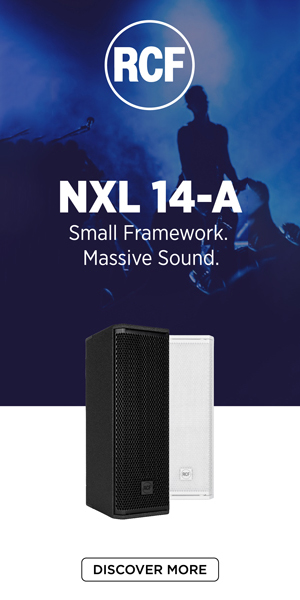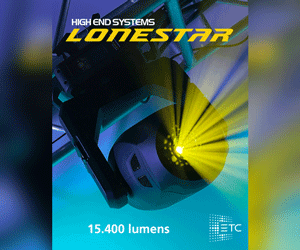As the cornerstone of its 50th Anniversary Season, the Orlando Ballet commissioned a spectacular new production of The Nutcracker, one of the world’s most popular and most performed ballets, which debuted last December.
Billed as “bigger, brighter, and full of surprises” as well as the largest ballet ever created by an Orlando-based performing arts organization, the production was staged in Steinmetz Hall at the Dr. Phillips Center for Performing Arts.
New choreography, all new sets, costumes, and an updated storyline by Jorden Morris, who also serves as the ballet’s artistic director, brought an exciting edge to a timeless classic, combined with a host of interesting and innovative staging elements including a lighting design by Joseph R. Walls.

Joseph incorporated Robe Forte moving lights and Footsie Led foot lights into his lighting scheme to bring extra vibrance and flair as the onstage action unfolded.
Joseph’s brief from Jorden was to create a fresh and invigorating contemporary look for the show as they presented an extravaganza of color, drama, and emotion to thrill Orlando and mid-Florida ballet lovers now … and for some years to come, as it is scheduled to run for the next 19 years over the festive holiday period.
The 26 x Fortes and 26 x Footsie1s were part of an additional lighting rental package supplied to the Orlando Ballet by Main Light from Delaware and were used in conjunction with the substantial house generic lighting rig.

Additionally, 6 x Anolis Calumma S multi-chip RGBA luminaires were purchased by the Ballet for this show and used for lighting within various scenic elements, proving ideal for offsetting the naturalistic interiors of scenes like the toy shop, pastry shop, and snow globe.
Joseph worked closely with Jorden and set designer Robert Perdziola to craft the show aesthetic. The set combined classic elegant touches with some high-impact operatic elements. The trim heights for productions in the venue are often around 30 feet, but for this one they were 48 feet, accentuating the scale of the scenography and requiring powerful lighting to work from that additional height.
Joseph consulted Main Light account executive Patrick Bellino who first suggested he look at Robe’s Forte as a solution, particularly as a good zoom and excellent dimming were top of the wish list. A demonstration followed which confirmed to Joseph that Forte was the “right fixture for the job.” “I needed a high CRI, a good range of whites, to be able to change colors and gobos, as well as a light source that was essentially clean and soft,” he explained, which is where Partick mentioned that units could be fitted with a heavy frost filter.
Of the 26 x Fortes supplied by Main Light, eight were fitted with the heavy frost, and two of the standard Fortes were run as follow spots, linked to a RoboSpot system operated via two base stations. Five Fortes were positioned on five of the overhead house bars (25 total) effectively replacing a whole ‘traditional’ top lighting system, while the rest were distributed on booms and additional ladders specified for “The Nutcracker”. They were used together with other luminaires from the Main Light rental package and the house rig.
Fortes saved valuable time and enabled Joseph to work quickly during the tech period. “I could not have lit the show with as much detail and complexity in the time without using moving lights,” he noted, also praising the talents and calm demeanor of his programmer, Bridget Chervenka, who worked purposefully and tirelessly through all the surrounding production hustle and pressure.
The 26 x Footsie1s in variable white were positioned along the front of the substantial stage in the standard footlights position. Lighting from these positions, especially for a ballet, has always been problematic as any lighting fixtures will obscure front sightlines, and specifically for those sitting in premium front stalls seats! “For years we have struggled to find fixtures that could be fitted in these positions and work effectively,” he commented, and now Footsie offers a practical solution.
Barely the same height as a standard sprung dancefloor, Footsie can blend seamlessly with the surrounding stage space. For The Nutcracker, Joseph used them to create spooky shadows for puppetry and various other sections of the show, utilizing the fixture’s individual zone control.
Zone control also enabled fluid ripples of light to flicker across the whole stage. The Footsies were used during the battle and other special magical moments when the stage was filled with color, either to denote specific locations, or to balance out shadows with an extra push from that position.
“They were invaluable in so many ways,” he commented, ‘The color, intensity and dimming from that angle were exactly what we needed,” and they were also ideal for highlighting Robert Perdziola’s striking costumes.
The show was a contrast between two worlds, reality, which was more naturalistically lit, and fantasy as the narrative followed a young girl’s love for a favorite Christmas gift from her town’s toymaker. The fantasy environments were energized with an enchanted aura including crispy, white, snowy wonderlands with twinkling lights which the Robe fixtures helped create.
The Fortes and the Footsies were also used to fine-focus on the protagonists onstage, while visual effects, color and textures were layered on and swirled around them.
Joseph appreciated the great teamwork and camaraderie of putting the show together. “It was a massive collaboration and hugely enjoyable,” he concluded.
Also on his lighting design team were associate Matt Taylor and assistant lighting designer Abi Farnsworth, production LX Lizz Pittsely and head LX Mike Boyle, all working alongside a great crew from IATSE 631. The show premiered in December 2023 and ran for 3 weeks and will return in December 2024.
For more info about Robe Lighting, you can visit the Robe Lighting website













